Last-Minute NYC Holiday Gift Guide 🎁
We’ve created a holiday gift guide with presents for the intrepid New Yorker that should arrive just in time—



Last week, New Yorkers were sad to hear that New York City’s famous Ziegfeld Theater is finally closing over the next few weeks for financial reasons. Rumors of its closing have circulated for years in recent times, and last week, news that the theater would officially close and be replaced by one of the largest ballrooms in New York City came out. With its plush red walls, luxurious gold curtains and huge screen, the Ziegfeld Theater, located on West 54th street, hosted many important events and has had countless celebrities pass through its doors. Thus, before this opulent, iconic venue finally closes, here are ten secrets you should know about the Ziegfeld Theater.

A big reason New Yorkers are sad to see the Ziegfeld Theater go is because it was New York City’s largest operating single-screen cinema, evoking an era of cinema grandeur with its scale and decor. With 1,131 seats and a 52 by 20 foot screen, the Ziegfeld Theater provided the ultimate cinema experience. In addition, the Ziegfeld Theater was one of the last large-scale movie palaces built in the United States and the second largest silver screen in the city after Radio City Music Hall.
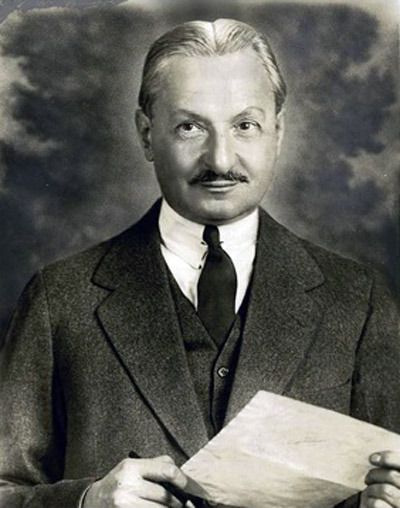
Florenz Ziegfeld Jr. Image via Wikimedia
The Ziegfeld Theater was named after the famous Broadway impressario, Florenz Ziegfeld Jr., who built the original in 1925 on the west side of Sixth Avenue between 54th and 55th Streets. The current building went up in 1969, next door to an earlier version. Ziegfeld, a member of the American Theater Hall of Fame, produced the famous Show Boat and conceived the Ziegfield Follies.
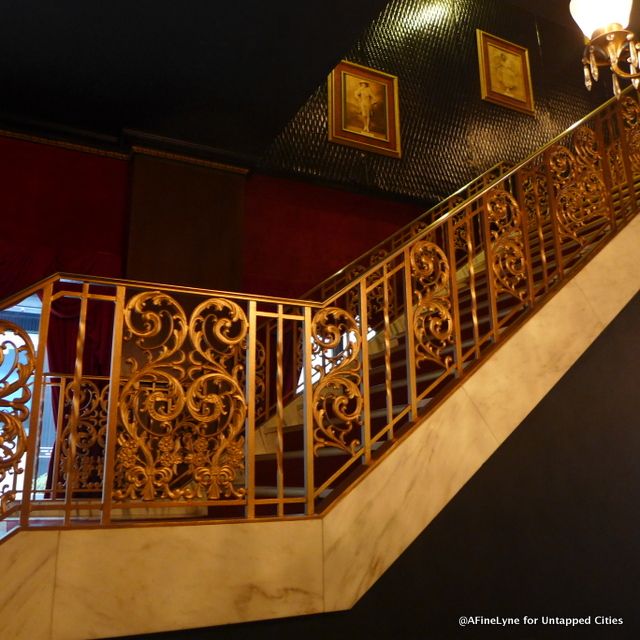
The Ziegfeld Theater had a long, eventful life, as documented by the New Yorker. After its 1927 completion, in 1933 it was converted into a movie house. Then in 1944, producer Billy Rose purchased the theater for $630,000 and reverted it back into a theater venue. In the 1950s, the Ziegfeld hosted “The Perry Como Show,” and in the 1960s, it reopened as a Broadway theater but was razed in 1966, to much public outcry. A skyscraper, called the Burlington House, now stands there. The most recent Ziegfeld movie house, built by the prolific architecture firm Emery Roth & Sons, opened a little way down 54th street in 1969, and since then, has hosted several important film premieres and galas.
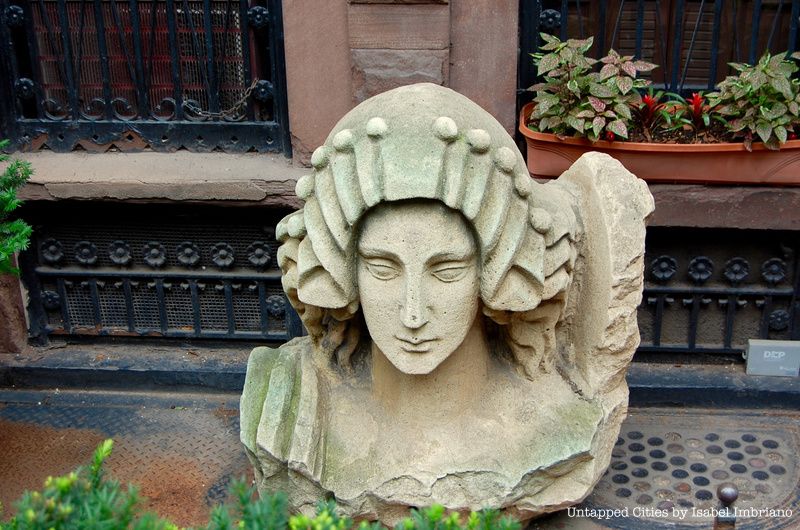
Unfortunately, there are almost no remnants of the original Ziegfeld Theater facade that you can see on the streets of New York City today (though the contents of the cornerstone of the Ziegfeld Theatre are at the New York Public Library). However, there is at least one vestige that you can see-and it’s in the front yard of a private residence at 52 East 80th street, which you can see for yourself on Google Street View.
The remnant is the huge, decapitated head of a Greco-Roman goddess, which likely laid at the front of the Ziegfeld Theater. But just how did it get to the yard of a random home? According to the New York Times, theatrical producer Jerry Hammer, who once owned the brownstone, was driving past the Ziegfeld Theater in the 1960s with developer Zachary Fisher, who said he was going to tear it down. Hammer (jokingly, supposedly) asked if he could have one of the theater’s grand limestone heads. A few months later, he heard a crane lowering the head down into his yard. When he moved out in 1998, Hammer left the head behind

The current Ziegfeld Theater’s ultramodern technology, which the New York Times once described as “space age,” has allowed for its success. The theater has a computerized console at the rear of the orchestra, which is visible to the audience, that does just about everything. The console not only fine-tunes and controls the theater’s sound, but also changes lenses in the projection booth, opens and closes the doors and curtains, brightens and dims the lights, and even controls the temperature. The theater also has a closed-circuit television system.
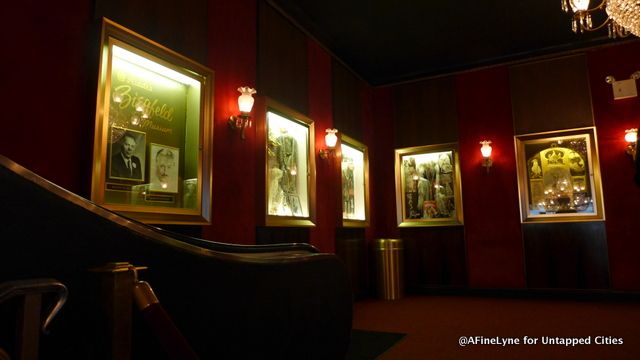
In order to pay for the $2.5 million, 1600-seat venue, Florenz Ziegfeld borrowed money from the famous newspaper publisher William Randolph Hearst. After Ziegfeld died, Hearst took control of the theater in 1932.
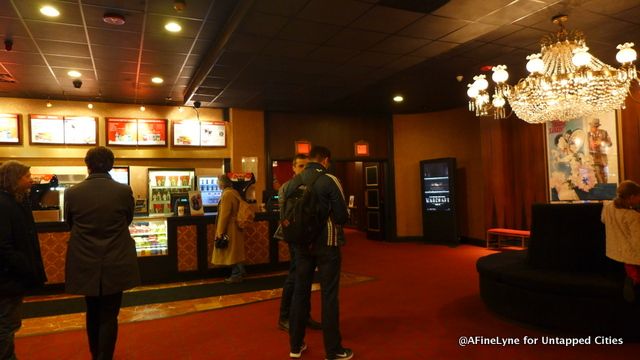
The iconic American silent-film actor Charlie Chaplin was among the first of many famous celebrities that would walk through both the original and new Ziegfeld Theater. When the theater opened on February 2, 1927, Chaplin attended its first premiere that evening – Rio Rita starring Abbott and Costello.
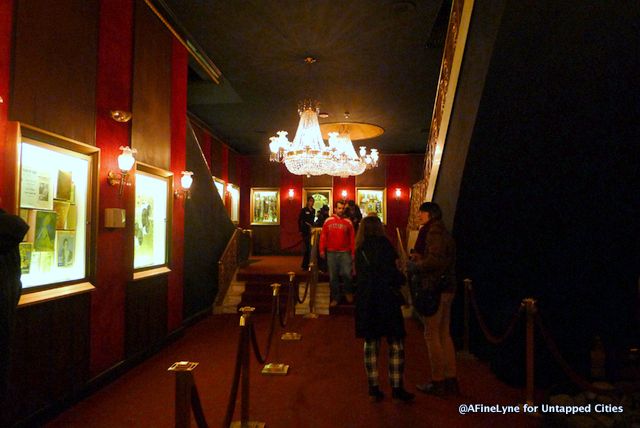
The Austrian-American architect Joseph Urban, known for his use of color and decorative use of lines, designed the original Ziegfeld Theater. Because of the auditorium’s egg shape, there weren’t carvings or ornamentations, so in accordance with his fantastical visions, Urban designed a mural for the Ziegfeld Theater, called “The Joy of Life.” The vast mural featured multicolored spinning dancers, musicians, cupids, stags, lovers, leaping gazelles and other medieval elements. It merged with the gold carpets and seats extending upwards, always in sight of the audiences.
Until 2006, there were no remnants of this mural. However, that year antiques dealer John Bermingham located a huge piece (measuring 24 feet wide by 14 feet high), which evidently survived the site’s demolition. It was then displayed at the New York Design Fair.
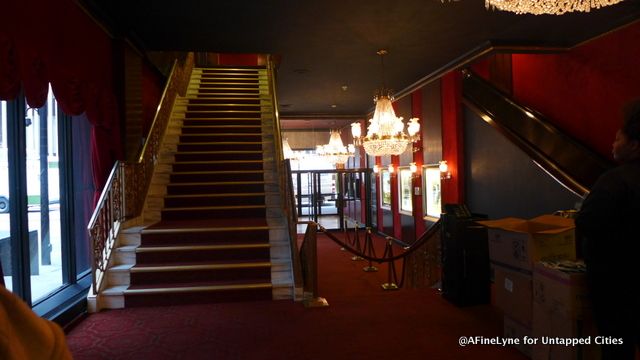
A staircase inside the opulent Ziegfeld Theater
Walter Reade was the new Ziegfeld Theater’s initial operator and president and chairman of the Walter Reade Organization, which owned and operated theaters in Manhattan. Reade’s wife, Dolly Martin Reade, oversaw the theater’s decor for its 1969 reopening. Linda Miller, who worked for the Walter Reade Organization in the late 1980s and worked premieres at the Ziegfeld numerous times, told us that on the third floor of the Ziegfeld Theater was a room designed to be a private office for Mr. Reade. She recalled that it was accessible by a small staircase.

Glass cases along the walls of the Zeigfeld’s downstairs lobby all the way up to the theater lobby contain numerous pieces of memorabilia, including outfits worn by the Ziegfeld Girls. One highlight is from the most famous and emotionally complex Ziegfeld Girl, Lillian Lorraine. Known as the “Ziegfeld Diva,” Lorraine had a relationship with Ziegfeld himself, who discovered her. Their relationship was anything but sane, as her behavior and affairs (while Ziegfeld continued the affair through two marriages) gave the tabloids plenty of headlines. Her career faded in the early 1920s, but her legacy lived on as she was the basis for characters in plays such as Gentleman Prefer Blondes and the 1936 feature film The Great Ziegfeld.
Next, read about the Ziegfeld Theater lobby’s museum, The Top 10 Secrets of NYC’s Legendary Apollo Theater in Harlem, and 9 Unique Movie Theaters You’ll Only Find in NYC. Get in touch with the author @sgeier97
Subscribe to our newsletter